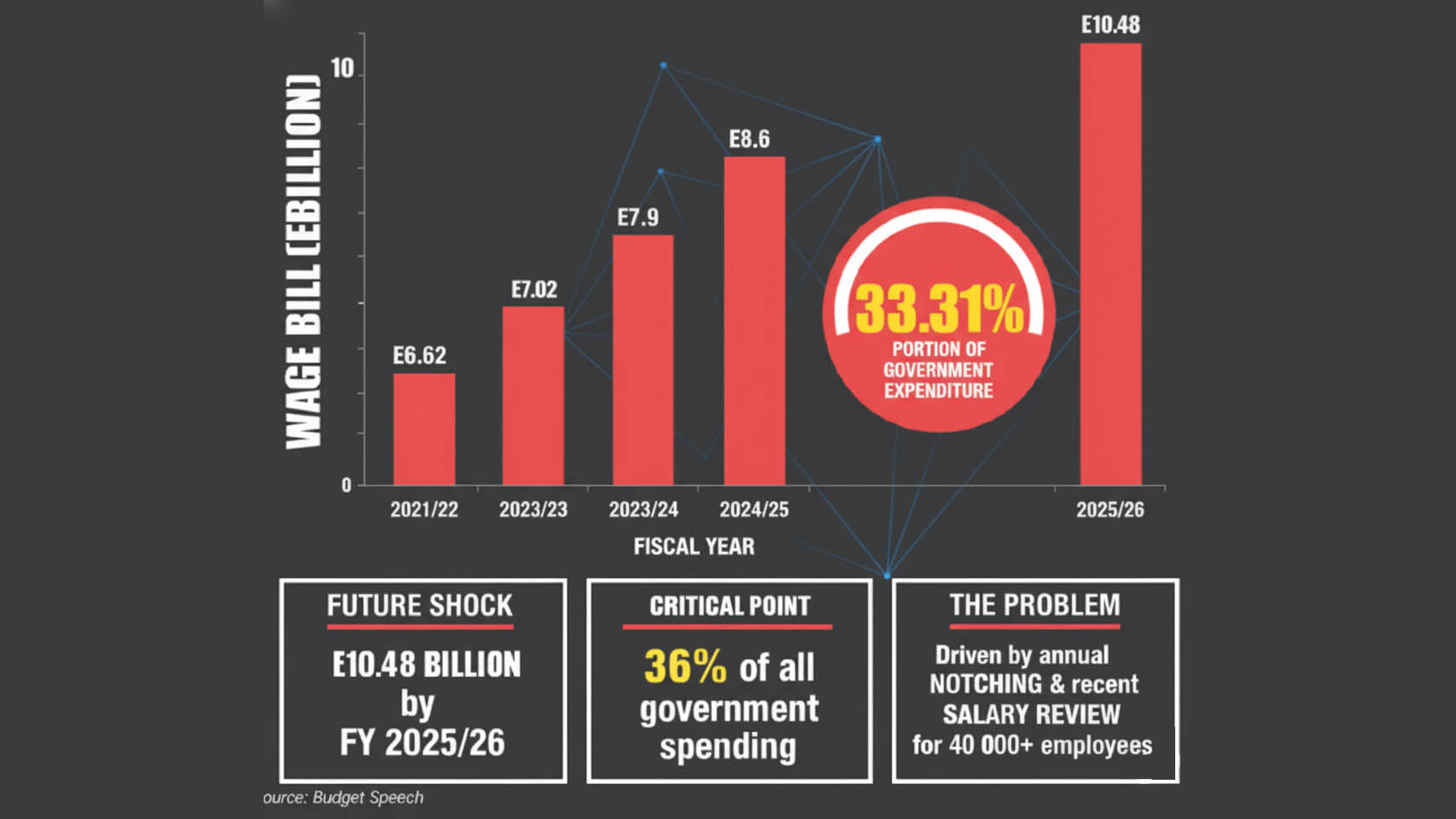
MANZINI – Government will reduce staff in order to deal with the wage bill.
The wage bill is the amount paid to personnel from government coffers. Minister for Finance Neal Rijkenberg, in his mid-term budget, stated that the wage bill is the largest single component of total expenditure in the national budget. He said it stood at E4.5 billion against a budget of E9.3 billion, which is about 48 per cent execution.
The implementation of the salary review for civil servants in October caused the wage bill to balloon. It is worth noting that the establishment register reflects 43 959 positions, which were occupied by civil servants in government and ministries.
As the wage bill is depleting more resources from government, the administration is said to have sought technical advice from the World Bank to seek options on how to contain it.
Personnel from the World Bank are said to have arrived in the country about three weeks ago to assist the Mabulala Maseko-led Ministry of Public Service.
The minister confirmed their arrival in the country, but could not divulge much on the advice shared by the World Bank. He said it would be premature as their advice was still to be discussed within the ministry and Cabinet. He said a final decision would be taken in Cabinet.
Maseko said the Enhanced Voluntary Retirement Scheme (EVERS) is what they (government) are hoping and leaning towards as the best possible option. He was quick to emphasise that the proposal is in its initial stages, as they are yet to engage with all relevant stakeholders.
The minister said for the plan to be effective, thorough consultations with all interested parties would be necessary to ensure transparency and satisfaction for all involved.
Maseko indicated that redundant areas and positions are likely to be targeted.
“We believe the majority will opt for EVERS, which is one of the possible considerations,” he said.
It is worth noting that EVERS is a form of an early retirement programme that offers incentives for employees to retire before the standard retirement age.
These incentives often include enhanced benefits such as substantial severance packages or immediate pension benefits.
Such schemes can benefit both employees and employers by enabling early retirement, allowing employees to pursue new ventures and helping organisations reduce their workforce and operational costs.
*…
Wage bill up by 36%
MBABANE – Despite the wage cap being eight per cent, it has increased by 36 per cent.
The 36 per cent hike follows the implementation of the salary review. According to the Ministry of Public Service’s Second Quarter Report for the 2025/26 Financial Year, the estimated wage bill was E9.388 billion, representing an eight per cent increase from the actual expenditure of E8.6 billion for the 2024/25 financial year.
This eight per cent increase, translated to approximately E688 million, which was established as the wage bill cap by the Planning and Budgeting Committee (PBC) and subsequently adopted by the MTFF.
*…
‘It could be a win-win situation if ...’
MBABANE - “It can be a win-win situation if approached correctly.”
This was said by Trade Union Congress of Swaziland General Secretary Mduduzi Gina when informed about the proposed exercise.
Gina said approached correctly, the exercise might attract many workers who want to explore other avenues in life. This, he said, is because workers fear leaving their benefits behind when venturing into other venues.
Gina said workers do take early retirement and explore other opportunities, adding that such is an acceptable practice.
However, Gina said it would be best if government does not structure the Enhanced Voluntary Retirement Scheme in a way that forces employees to take early retirement.
*…
Economist weighs voluntary exit
MBABANE - Economist Thembinkosi Dube says the voluntary exit has its fair share of pros and cons.
In an interview, he revealed that the positive side of it was that the wage bill will definitely go down if people take the offer to leave the public service earlier than the regular retirement age.
However, he said it could also backfire for government in the sense that the employees, whose positions have probably become defunct could elect not to leave, yet they are the very group that government wants to get rid of.
“You find that it is the anchors of the civil service that may choose to leave and that could leave government in a desperate position because the group that it needs to leave can elect to stay and that would not be against any policy,” he said.
Dube also advised that government’s ‘weeding’ should start in the security forces because that is where most veterans above the retirement age, are highly concentrated, yet there are emaSwati who are equally capable of the task.
“We have a lot of people who have reached the retirement age, but are still part of the civil service and that should be the first stop for government if it really wants to help the situation,” he said.
*Full article available in our publication

Eswatini’s rising wage bill crisis.